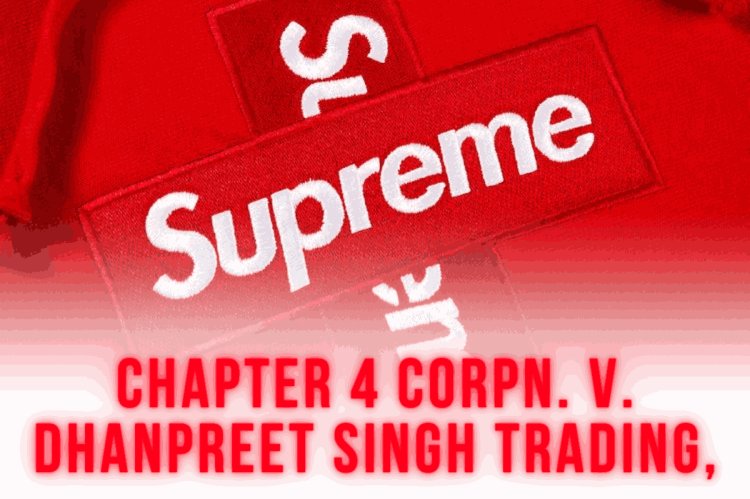Chapter 4 Corpn. v. Dhanpreet Singh Trading, 2023
This case involves a lawsuit filed by the plaintiff, seeking a permanent injunction to protect its 'SUPREME' red-box device mark used in readymade clothing and accessories. The plaintiff, having used the mark since 1994 in the USA and 2006 in India, owns numerous registrations globally and alleges infringement by the defendant, Punjabi Adda. The court granted an ex-parte ad interim injunction and later decreed the plaintiff's mark as 'well-known', emphasizing its exclusivity and global recognition. The defendant opted for settlement negotiations, and the court's decision was influenced by the parties' Settlement Agreement, which restricted the defendant from seeking statutory rights for similar marks.

Chapter 4 Corpn. v. Dhanpreet Singh Trading, 2023
SCC OnLine Del 4454
Decided on 11-07-2023
The plaintiff has filed a lawsuit to obtain a permanent injunction and protect its red-box device mark 'SUPREME' used for readymade clothing, accessories, and other products. The plaintiff started using the mark in 1994 in the USA and in India since 2006. They also own the website supremenewyork.com, which promotes and markets their products globally. The plaintiff has over 700 registrations worldwide for the mark 'SUPREME' in different classes such as Class 25, and they have been using it continuously. The plaintiff has also applied for the 'SUPREME' red box device mark in India. The defendant, trading as Punjabi Adda, is accused of using the 'SUPREME' mark on their t-shirts and selling them on their websites at www.punjabiadda.com and www.punjabiadda.us. The plaintiff became aware of the defendant's activities and the use of the 'SUPREME' mark in July 2022. The plaintiff has filed the lawsuit to obtain a permanent injunction and a decree that recognizes their 'SUPREME' red box device mark as a 'well-known' mark under Section 2(zg) of the Trade Marks Act, 1999.
Contentions of the Plaintiff
The Plaintiff stated that they have used different versions of the "SUPREME" brand name over the years. They have also received extensive media coverage and support from celebrities worldwide. The Plaintiff argued that their business model, which is characterized by scarcity and exclusivity, has helped create a lot of notoriety for the brand. They further stated that they have obtained over 700 trademark registrations globally, which is evidence of the widespread recognition of the mark. Additionally, the Plaintiff has successfully enforced its rights in the "SUPREME" brand name in various countries, which further supports their claim of being a well-known mark. The Plaintiff requested a declaration that their mark "SUPREME" red-box device mark is a "well-known" mark under Section 2(zg) of the Trade Marks Act, 1999.
Contentions of the Defendant
Despite not submitting a written statement in the lawsuit, the Defendant opted to participate in settlement negotiations with the Plaintiff to potentially resolve the matter outside of the court.
Court Judgement
On November 11, 2022, the court granted an ex-parte ad interim injunction in favour of the plaintiff. The court restrained the defendant and anyone acting on their behalf from engaging in activities such as offering for sale, selling, displaying, or using the plaintiff’s ‘SUPREME’ red box device mark and the word mark ‘SUPREME’. The court noted that various celebrities including Justin Bieber, Beyonce, Madonna, Rihanna, and Sade had endorsed the plaintiff's clothing. In India, the plaintiff's products bearing the mark ‘SUPREME' had been endorsed by celebrities such as Diljit Dosanjh, Ranbir Kapoor, and Karan Johar, among others.
The plaintiff prayed that the mark be declared a ‘well-known' mark. The court granted a ‘well-known' status to ‘Arcuate Stitching Mark' in Levi Strauss and Co. v. Imperial Online Services (P) Ltd., 2022 SCC OnLine Del 986. The court noted that the plaintiff and the defendant had entered into a Settlement Agreement wherein the defendant agreed not to file any trademark/copyright application to register the plaintiff’s ‘SUPREME' marks or any mark similar to the plaintiff’s marks for any goods or services such as readymade clothing and related goods and services. The court opined that the terms of the Settlement Agreement were lawful and there was no impediment in recording the same.
Thus, the court decreed the suit under Order XXIII Rule 3 of the Civil Procedure Code, 1908, in recognition of the trade mark rights and common law rights in the red-box device mark ‘SUPREME' in favour of the plaintiff. Further, the court restrained the defendant from seeking any statutory rights by applying for trademarks or copyrights in respect of the red-box device mark ‘SUPREME'.
The court opined that based on the reputation in the red-box device mark ‘SUPREME', the plaintiff had acquired a ‘well-known' status. The red-box device ‘SUPREME' had acquired a secondary meaning keeping in mind the extent of usage of the said device mark. Therefore, the said red-box device mark deserves to be protected. Considering the period of 29 years during which the red-box device mark ‘SUPREME' had been used for readymade clothing, the said mark had achieved the status of a ‘well-known mark'.
Accordingly, the court passed a decree of declaration declaring the red-box device mark as a ‘well-known' mark in respect of apparel and clothing. Further, since the word ‘SUPREME' was a dictionary word, the declaration of well-known was limited to the ‘SUPREME' red-box logo and not the word itself. The court also directed that since the matter had been settled between the parties, 50% of the court fee was to be refunded to the plaintiff through counsel.
Courts Analysis
The court granted a 'well-known' status to the 'SUPREME' red-box device mark, emphasizing its exclusivity and global recognition. The Settlement Agreement played a pivotal role in the court's decision, reinforcing the defendant's commitment to refrain from filing any trademark or copyright applications for marks similar to 'SUPREME.' The court's decree solidified the mark's 'well-known' status, ensuring restrictions on the defendant's future attempts to seek statutory rights for similar marks.












